De Amerikaanse schrijver Steven Saylor werd geboren op 23 maart 1956 in Port Lavaca Texas. Zie alle tagsvoor Steven Saylor op dit blog.
Uit: A Gladiator Dies Only Once
„Lucius Claudius lowered the little scroll and raised his bushy red eyebrows. “Gordianus! By Hercules, you got here in a hurry! Take a seat.”
I looked about for a chair, then remembered where I was. In the garden of Lucius Claudius, visitors did not fetch furniture. Visitors sat, and a chair would be slipped beneath them. I stepped into the spot of sunlight where Lucius sat basking, and folded my knees. Sure enough, a chair caught my weight. I never even saw the attendant slave.
“Something to drink, Gordianus? I myself am enjoying a cup of hot broth. Too early in the day for wine, even watered.”
“Noon is hardly early, Lucius. Not for those of us who’ve been up since dawn.”
“Since dawn?” Lucius grimaced at such a distasteful notion. “A cup of wine for you, then? And some nibbles?”
I raised my hand to wave away the offer, and found it filled with a silver cup, into which a pretty slavegirl poured a stream of Falernian wine. A little tripod table appeared at my left hand, bearing a silver platter embossed with images of dancing nymphs and strewn with olives, dates, and almonds.
“Care for a bit of the Daily? I’m finished with the sporting news.” Lucius nodded toward a clutter of little scrolls on the table beside him. “They say the Whites have finally got their act together this season. New chariots, new horses. Should give the Reds a run for the prizes in tomorrow’s races.”
I laughed out loud. “What a life you lead, Lucius Claudius. Up at noon, then lolling about your garden reading your own private copy of the Daily Acts.”
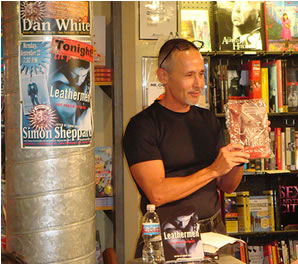
Steven Saylor (Port Lavaca, 23 maart 1956)
Hier als zijn alter ego Aaron Travis
De Amerikaanse schrijver Mitch Cullin werd geboren op 23 maart 1968 in Santa Fe, New Mexico. Zie alle tags voor Mitch Cullin op dit blog.
Uit: The Post-War Dream
„Throughout the years Hollis has observed them among his dreams, watching from a distance as they foraged under a blackened sky. After a time he understood that they, like him, had sensed the flux of earth, yet were undaunted: having journeyed perhaps twenty miles in almost fifty days, a procession of cows-nomadic Herefords and Jerseys-grazed onward, wobbling over a moonlit prairie, bulky heads lowered; their hooves crunched sandstone and pumice, and their excreta, hardening behind them, marked the slender trail in uneven circles-testaments to how far they had come, symbols of presence, like the burned-out and rusting wheelless cars they encountered within unkempt pastures of bluebonnets and high brittle grass, or the gutted houses abandoned on good soil (porches collapsing, doors gone, the wind sneaking through busted panes into dim interiors), or any number of fading signposts passed along the way, those many things fashioned by man-made design and then left again and again as the herd proceeded, weaving blindly ahead for no other reason than it must.
And there, too, he has infrequently witnessed the approach of other languid creatures: half-naked human figures emerging whenever the recurring cows failed to manifest, hundreds of pale bodies cutting through the landscape, angling across the same nighttime terrain but traveling in the opposite direction.”
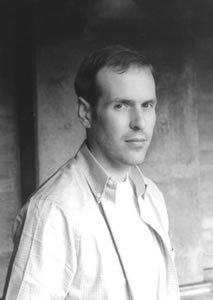
Mitch Cullin (Santa Fe, 23 maart 1968)
De Japanse dichteres en schrijfster Yōko Tawada werd geboren op 23 maart 1960 in Tokyo. Zie alle tags voor Yōko Tawada op dit blog.
Uit: An der Spree
Ich bin in Europa, ich weiß nicht, wo ich bin. Eines ist sicher: der Nahe Osten ist von hier aus ganz nah. Der Ort, von dem aus der Nahe Osten ganz nah ist, heißt Europa. Als ich noch im Fernen Osten lebte, war der Nahe Osten ganz fern. Auch das war aber ein Irrtum. Der Nahe Osten war nicht so fern vom Fernen Osten, wie man im Fernen Osten gedacht hatte. Die Seidenstraße verband einen Punkt schnell mit einem anderen. So wurde die alte Kaiserstadt Kyoto von den Persern gebaut, die über China weiter nach Japan gewandert waren. Kyoto ist also eine persische Stadt. Der Nahe Osten ist der Ort, der von überall aus nah ist.
Europa liegt dort, wo die Seidenstraße endet. Aber da die Seidenstraße heute zerstört und zerschnitten ist, kann man keine Linie bis Europa ziehen. Sollte man die komplizierte Mitte überfliegen? Kann eine geflügelte Maschine das Ziel erreichen, ohne den flammenden Weg zu berühren? Ich stand auf dem Flughafen Tokyo-Narita und las die blinkenden Ortsnamen auf der Tafel: Amsterdam, Brüssel, Frankfurt, Helsinki, Istanbul, London, Madrid, Moskau, Paris, Rom, Wien. Sie standen da wie bunt eingepackte Weihn
achtsgeschenke. Europa liegt dort, 12 wo die Flugzeuge landen. Sie landen aber nicht immer dort, wo die Landung geplant ist.
Mit dem Warszawa-Express kam ich in „Berlin Zoologischer Garten“ an und entdeckte in „Berlin“ ein „B“, im „Zoologischen“ ein C und im „Garten“ ein A. Das Alphabet erinnerte mich immer an den Nahen Osten. Vilém Flusser schrieb: „Das A zeigt noch immer die Hörner des syriakischen Stiers, das B noch immer die Kuppeln des semitischen Hauses, das C (G) noch immer den Buckel des Kamels in der vorderasiatischen Wüste.“
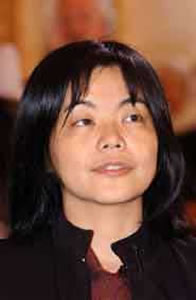
Yōko Tawada (Tokyo, 23 maart 1960)
De Amerikaanse dichter Gary Joseph Whitehead werd geboren op 23 maart 1965 in Pawtucket, Rhode Island. Zie alle tags voor Gary Whitehead op dit blog.
Bats
Come dark, they drop
out of the barn’s slotted roof
like a flock of birds trapped in black gloves,
a loveless, ravenous
brood of clenched leather
winging eager mouths into the bowl of sky.
Their hunger is a flower
to which they fling a song
we cannot hear because we cannot hear,
and this song,
when it comes back to them
comes back to them with the news
of what is in between
and what will feed,
and they read this news and carry off
the pollen of night
—all that knowledge—
like the black, black butterflies we make of them.
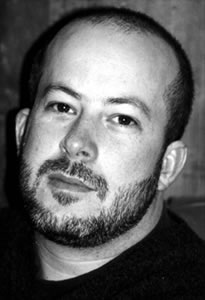
Gary Whitehead (Pawtucket, 23 maart 1965)
De Samische dichter, schilder, musicus en fotograaf Nils-Aslak Valkeapää werd geboren op 23 maart 1943 in Palonjoensuu nabij Enontekiö. Zie alle tags voor Nils-Aslak Valkeapää op dit blog.
Can you hear the sound of life
in the roaring of the creek
in the blowing of the wind
That is all I want to say
that is all
*
this is my life
winds and smoky snow
sunshine and drizzle
the sound of bells and dogs barking
the bluethroat singing
in the tundra as wide as a sea
that is how my life’s rain falls
winds blow
ice rumbles
storms howl across the tundras
this is my life
its sorrows tears the heart’s crying
its happiness and joy
and delight
yesterday and today
brothers and sisters
young and old
men and women
this is my life
I am a part of nature
I feel I know
The yoik in wind
The bird’s singing in summer night
Vertaald door Harald Gaski, Lars Nordström en Ralph Salisbury
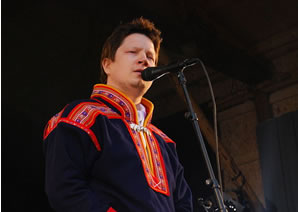
Nils-Aslak Valkeapää (23 maart 1943 – 26 november 2001)
De Zwitserse schrijfster Federica de Cesco werd geboren op 23 maart 1938 in Pordenone, Italië, als dochter van een Italiaanse vader en een Duitse moeder. Zij groeide meertalig op en studeerde kunstgeschiedenis en psychologie in Luik. Sinds 1971 is zij getrouwd met de Japanse fotograaf Kazuyuki Kitamura. De Cesco werd in eerste instantie bekend als schrijfster van succesvolle kinder- en jeugdboeken. In 1994 publiceerde zij haar eerste roman voor volwassenen. Daarnaast schreef zij boeken, waarin zij haar kennis van volkenkunde en haar ervaringen als wereldreiziger verwerkte. Een film over haar leven door Nino Jacusso verscheen in 2008.
Uit: Die Augen des Schmetterlings
„In mir lebt ein jüngerer Bruder, der gestorben ist. Henrik kam ein Jahr nach mir zur Welt. Mit zwölf war er tot. Irgendwie habe ich ihn in meine Nähe geholt, lebe sozusagen mit ihm zusammen. Ich spreche oft zu ihm; wenn er will, gibt er Antwort. Sein Gesicht, das die Welt jenseits des Todes erblickt, sehe ich manchmal im Traum, sehe es ganz langsam aus der Tiefe schweben, von grünem Wasserfilm überglänzt. Ich sehe Augen, die glasklar starren, und eine Luftblase löst sich aus dem offenen Mund. Der Körper bewegt sich schattenhaft, die Arme schweben wie Flossen, die Finger sind leicht gespreizt, aufgeschürft und grünlich verfärbt. Vielleicht ist er jetzt das, was er sein wollte: verwandelt. Leicht dreht sich die Traumgestalt in der Strömung. Ich will sie packen, festhalten vergeblich! Die Gestalt gleitet weg, kreist schneller. Lautlos, von Luftblasen umgeben, entschwindet der Körper in dunkel schillernde Tiefen. Den Traum hatte ich früher häufig. Jetzt seltener. Es gibt Leid, aber auch Trost.“
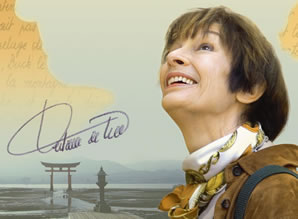
Federica de Cesco (Pordenone, 23 maart 1938)
De Franse schrijver Roger Martin du Gard werd geboren op 23 maart 1881 in Neuilly. Zie ook mijn blog van 23 maart 2007.
Uit: La parabole de l’enfant prodigue
“Jacques crispait les poings au fond de ses poches et comprimait le menton contre sa poitrine, afin qu’aucun sanglot ne pût jaillir de sa gorge, afin qu’aucun muscle de visage ne pût le trahir. Lui seul savait combien il souffrait de ne pas avoir demandé pardon, quelles larmes délicieuses il eût versées s’il eût reçu l’accueil de Daniel ! Non ! et puisqu’il en était ainsi, jamais il ne laisserait soupçonner à personne ce qu’il éprouvait pour son père, cet attachement animal, assaisonné de rancune, et qui semblait même avivé depuis qu’aucun espoir de réciprocité ne le soutenait plus !
L’abbé se taisait. La placidité de ses traits rendait plus pesant son silence. Puis, le regard au loin, sans autre préambule, il commença, d’une voix de récitant :
-“Un homme avait deux fils. Or, le plus jeune des deux, ayant rassemblé tout ce qu’il avait, partit pour une région étrangère et lointaine ; et là il dissipa son bien en vivant dans le désordre. Après qu’il eut tout dépensé, il rentra en lui-même et dit : Je me lèverai et je m’en irai vers mon père, et je lui dirai : Mon père, j’ai péché contre le ciel et à tes yeux je ne suis plus digne d’être appelé ton fî. Il se leva donc et s’en fut vers son père. Et comme il était encore loin, son père l’aperçut et il fut touché de compassion ; et courant à lui, il le serra dans ses bras et l’embrassa. Mais le fî lui dit : ” Mon père, j’ai péché contre le ciel et à tes yeux je ne suis plus digne d’être appelé ton fî…”
A ce moment, la douleur de Jacques fut plus forte que sa volonté : il fondit en larmes.
L’abbé changea de ton :
-” Je savais bien que tu n’étais pas gâté jusqu’au fond du cœur, mon enfant. J’ai dit ce matin ma messe pour toi. Eh bien, va comme l’Enfant prodigue, va-t’en trouver ton père, et il sera touché de compassion. Et il dira, lui aussi : ” Réjouissons-nous, car mon fî, que voici, était perdu, mais il est retrouvé ! “
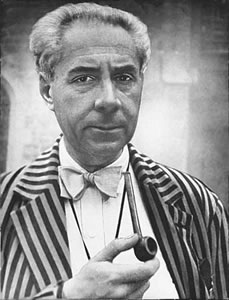
Roger Martin du Gard (23 maart 1881 – 22 augustus 1958)
De Hongaarse schrijver Hamvas Béla werd geboren op 23 maart 1897 in Eperjes (tegenwoordig Prešov). Zie alle tags voor Hamvas Béla op dit blog.
Uit: Heloïse and Abélard (Vertaald door Péter Simon)
„Only ephemeral works are worth publishing; immortal ones can stay in manuscripts. When the author dies the maid can collect them in a basket and take them to the kitchen to make the fire. If something has been written immortally, its existence does not depend on human memory. It has triumphed somewhere else, eternally and infinitely. It did not want credit or fame, money or power, it did not wish to teach or please. Why would it want fame, money, power, praise or credit? Every work takes place somewhere, and in every work something takes place. Almost all of them take place here on earth, between man and man. I want to persuade someone, I want to entertain, teach, fight, argue, conquer, amaze. The eternal work does not take place here. But higher. And deeper. And what is in it takes place between man and God. It has taken place. Even if no one knows. And God remembers in his heart when the paper has burnt, just like a porphyry obelisk disintegrates like sand. It has nothing to do with the book any more; it does not need a reader. It does not need a storyteller.
Immortal works have almost all burnt away, and from the few we have left no one knows where they got lost, what they are, who wrote and what. No one can have an idea about the loss, just like no one can know the thoughts of the one who set off to the ocean on a lonely boat all by his own and never returned.“
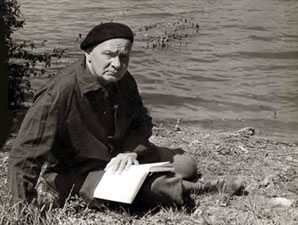
Hamvas Béla (23 maart 1897 – 7 november 1968)
De Franse dichter en schrijver Daniel Biga werd geboren op 23 maart 1940 in Nice. Zie ook mijn blog van 23 maart 2007 en ook mijn blog van 23 maart 2008.
Uit: Né nu
né nu
vécu vêtu truqué à peine vivant si peu chair épanouie
et si peu esprit ouvert…
mais si un jour tu n’avais plus peur d’être seul si tu n’avais
plus d’angoisse ni panique parmi ces êtres enfin semblables dénudés
démasqués égaux sans mensonge
né nu
tu te tiendrais à nouveau nu corps et âme
“bonne année !” que tes voeux les plus subtils éclatent
hors de ta tête dans le corps nu et l’âme nue de la vie
va ! que le matérialisme puissamment dialectique et que
la paix profondément cosmique règnent en toi
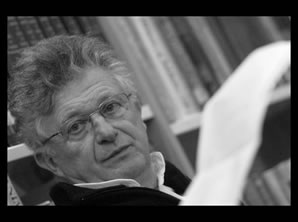
Daniel Biga (Nice, 23 maart 1940)
Zie voor de onderstaande schrijfster ook mijn blog van 23 maart 2007 en ook mijn blog van 23 maart 2008.
De Oostenrijkse schrijfster Ceija Stojka werd op 23 maart 1933 geboren in Kraubarth.
